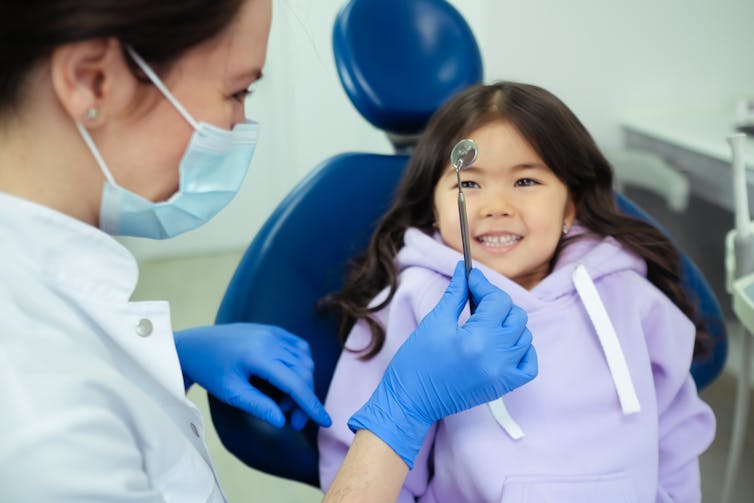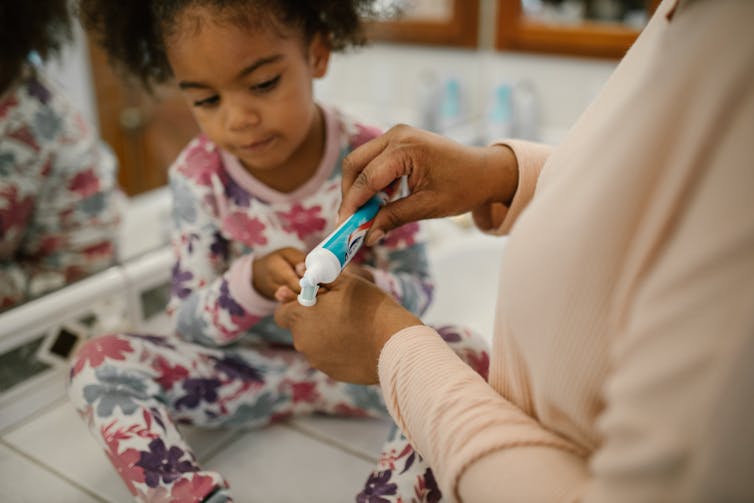One in three Australian children have tooth decay by the time they start school. This rises to more than 40% by the time they’re eight or nine.
Teeth decay occurs when frequent and excessive amounts of sugar disturb bacteria in the mouth. This can lead to holes or “cavities”, which may need fillings.
If untreated, the holes can get bigger, causing pain and infection. Tooth decay is the most common cause of toothache among children and tooth decay is a leading cause of preventable hospital admission.
Parents and carers sometimes think baby teeth are less important than adult teeth. But tooth decay can impair a child’s ability to eat, sleep, learn and socialise. It can affect the quality of life of children, and their parents and carers.
The good news is tooth decay is preventable with three good dental habits: early dental check-ups, twice daily brushing and limiting sugar.
Read more: Yes, baby teeth fall out. But they're still important — here's how to help your kids look after them
1. Early dental check-ups
Australian and international guidelines recommend children have their first dental check-up when the first tooth emerges from the gums (usually at age six months), or by at least 12 months of age.
Yet few families follow this advice, presuming their child is too young, or that they have healthy teeth.
Early dental check-ups can pick up early signs of tooth decay. This allows simple treatments, such as topical fluoride varnish, which stop tooth decay getting worse.

Australian children from families experiencing the greatest adversity are the least likely to access dental services. However, all preschool-aged children are eligible for free dental check-ups through public dental services.
Medicare’s Child Dental Benefits Scheme also provides a capped benefit for eligible children to use at their local dentist. Around 95% of dentists bulk bill services under the Medicare scheme.
However, with uptake below 40%, most eligible families are not using the scheme, indicating cost is only one barrier. Families living in rural and remote areas, for instance, may find it difficult accessing dental services.
Read more: Why some kids are more prone to dental decay
2. Brush their teeth
Twice daily brushing using age-appropriate fluoridated toothpaste is recommended. The Australian fluoride guidelines recommend a low-strength fluoridated toothpaste is used from 18 months of age.
Many young children have teeth spaced apart, so flossing between teeth may not be necessary. However, your dentist may recommend flossing if teeth are in tight contact.
While most Australian adults brush their teeth twice daily, tooth brushing is less consistent in the early years.

For some parents and carers, tooth brushing can be a low priority, as it becomes difficult when young children are uncooperative. Dental check-ups can help parents and carers get individualised support with these important dental habits.
Manual dexterity varies between children, so it’s important to assist children with tooth brushing well into primary school. Some children may need help for longer than others. Ask at your next dental check-up whether your child is brushing well.
3. Limit sugar
Consuming sugar early in life can increase the preference for sugar as children get older.
Parents and carers should avoid giving free sugars to children. Free sugars are those added to food and drinks (such as confectionery and soft drinks) and those naturally present in honey and fruit juices.
The World Health Organisation recommends limiting free sugars to less than 5% of total energy intake. However, many Australian children consume well above this amount.
Parents and carers should be wary of aggressive marketing and deceptive labelling of sweet drinks and snacks as healthy alternatives.
Children should also avoid eating and drinking around bedtime to reduce the risk of tooth decay. This includes consumption of milk and other sugar-sweetened drinks from bottles to sleep.

The best alternative to sugar-sweetened drinks is water. Drinking water from a fluoridated water supply will help protect your child’s teeth from decay.
Community water fluoridation was one of the greatest public health achievements of the 20th century. But some Australians, particularly in rural and remote areas, miss out. People living in these areas might benefit from other fluoride therapies (such as fluoride mouth rinses) but should discuss this with their dentist.
Families have an important role to play in children’s dental health. Early dental check-ups, brushing teeth twice a day with age-appropriate fluoridated toothpaste, and limiting sugar will allow children to reach adulthood with healthy mouths.

